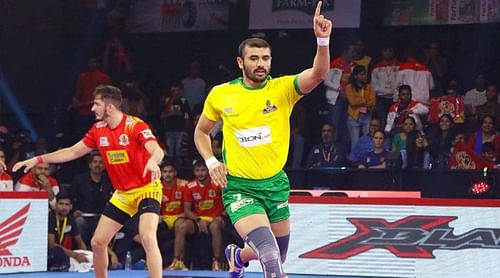
Pro Kabaddi League: Ajay Thakur keen to play kabaddi for at least three more years

Former captain of the Indian kabaddi team, Ajay Thakur recently said that he is keen to play for three more years, but his responsibilities outside of the mat have made it difficult for him to train.
As a Deputy Superintendent for the Himachal Pradesh Police, Ajay Thakur was seen patrolling the streets during the COVID-19 lockdown. As the pandemic forced almost every sporting event to get canceled this year, he couldn't get a chance to train since February. Despite that, his hunger to get back on the mat hasn't dimmed one bit.
In an interview with the Indian Express, the 34-year-old revealed his desire to keep on playing, even though he isn't convinced if he will be able to maintain his fitness.
"When I won the Arjuna Award last year, I was confident I’d play at least another three years,” Ajay Thakur said. “I still want to play at least three years, but it’s going to be much more difficult to stay fit. It’s not just because of the age though," he added.
Postponement of PKL was a massive loss for older players like me: Ajay Thakur
The eighth edition of the Pro Kabaddi League (PKL) has been postponed to next year following the COVID-19 outbreak. The PKL organizers took the decision for the safety of the players and related personnel.
Ajay Thakur shared his thoughts about it and said that it was a massive loss for the older players, who have only a few years left in the game.
“This was a massive loss for us players, especially for the older players like me who maybe have less than five years left to play. The biggest thing was that we couldn’t play kabaddi at all. But now, there is always a fear that 'Am I also infected with the coronavirus?'"
The Himachal Pradesh-born Ajay Thakur posted various messages on his social media handle during the lockdown, urging people to follow social distancing rules. Thakur recalled how he fulfilled his police duties at that time, which had then become a 24-hour job for him.
“The most difficult bit was to get migrant workers, who were heading back to their homes, to enter quarantine. I’d be up early in the morning and return home only after 11 at night, sometimes two in the morning. There were people passing by at any time of the day. People would be trying to sneak out in the middle of the night, so it actually became a 24-hour job for us," Ajay Thakur said while describing his life in lockdown.